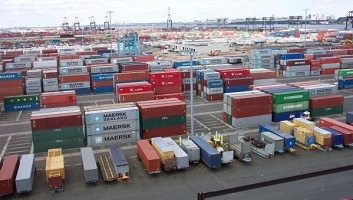Ports: Issues Nigeria Must Address to Stimulate Economic Growth, Regain Competitive Advantage

Container terminal at Apapa...
By Fwdr Eugene Nweke Rff.
*A REVIEWED CONTRIBUTION ON THE IMPLICATIONS OF LOOSING CARGOS TO NEIGHBOURING COUNTRIES DUE TO POOR INFRASTRUCTURE AND HIGH SHIP AND PORT HANDLING CHARGES:*
Let me begin by noting that the loss of cargoes to neighbouring countries due to poor infrastructure and high shipping and port handling charges has severe implications for Nigeria.
Unfortunately, this development has gone beyond an emerging development and now progressed to a seemingly urgent un-arrestable development in the nation’s shipping transportation system.
Gradually, this implication is toeing a dwindling effects on the nation’s Gross Domestic Product (GDP) performance cum our Balance of Trade (BOT) performance.
These implications include and not limited to:
*A. Economic Implications:*
1. Reduced Revenue: Loss of cargoes means reduced revenue for the government, ports, and related businesses.
2. Decreased Economic Growth: Lower cargo volumes hinder economic growth, development, and job creation.
3. Increased Unemployment: Reduced economic activity leads to job losses in the maritime, logistics, and related sectors.
4. Decreased Foreign Exchange Earnings: Reduced cargo volumes result in lower foreign exchange earnings.
*B.Social Implications:*
1. Increased Poverty: Reduced economic activity exacerbates poverty and inequality.
2. Decreased Standard of Living: Lower economic growth affects the standard of living, healthcare, education, and infrastructure development.
3. Increased Migration: Unemployment and poverty drive migration to other countries.
*C. Infrastructure Implications:*
1. Underutilized Infrastructure: Poor infrastructure and low cargo volumes lead to underutilized ports, roads, and railways.
2. Maintenance and Upgrade Challenges: Reduced revenue hinders maintenance and upgrade of existing infrastructure.
3. Limited Investment: Poor infrastructure discourages investment in the maritime and logistics sectors.
*D. Security Implications:*
1. Increased Smuggling: Poor infrastructure and high costs encourage smuggling, undermining national security.
2. Border Insecurity: Weak border control and smuggling activities compromise national security.
3. Piracy and Crime: Reduced economic activity and poor infrastructure create opportunities for piracy and crime.
*E. Competitiveness Implications:*
1. Loss of Competitive Advantage: Nigeria’s poor infrastructure and high costs erode its competitive advantage.
2. Regional Hub Status: Nigeria risks losing its status as a regional trade hub.
3. Reduced Investment Attraction: Poor infrastructure and high costs deter investors.
*F. Government Revenue Implications:*
1. Reduced Customs Revenue: Lower cargo volumes result in reduced customs revenue.
2. Decreased VAT and Tax Revenue: Reduced economic activity leads to lower VAT and tax revenue.
3. Increased Dependence on Oil Revenue: Reduced non-oil revenue increases dependence on oil revenue.
*G.How To Tackle The Challenges* :
To tackle these challenges, Nigeria government has a duty to:
1. Invest in infrastructure development (ports, roads, railways).
2. Implement reforms to reduce shipping and port handling charges.
3. Enhance efficiency and transparency in port operations.
4. Promote public-private partnerships (PPPs) in infrastructure development.
5. Develop incentives for exporters and importers.
6. Strengthen border security and smuggling prevention.
7. Improve trade facilitation and customs processes.
8. Diversify the economy to reduce dependence on oil revenue.
*H.Advanced Consequence Of Cargos Lose To Neighbouring Countries*
Findings show that, cargo lose to neighbouring countries constitutes and fraction to the rising incidences of inflation and exchange rate woes/pressure in the land due to unaccountable revenue from smuggled goods into the country through unapproved borders.
This is because, the foreign exchange funding of these trade or imports originated from the Nigeria commercial bank.
Also, cargo lose to neighbouring countries puts pressure on the government to prioritize public spending to protect human life ( usually endangered, courtesy of rerouting of contrabands and dangerous imports via the unapproved borders into the country), increasing the rise in fiscal deficit and to an extent possible constituting an impediment to preserving economic growth potential.
Therefore, the need to maintain some fiscal discipline can not be overemphasized.
In this regards, the need for the central bank to stabilize macroeconomic and financial developments through effective monetary and exchange rate policies, is apt.
In addition, appropriating policy concerns will help in containing inflation and exchange rate volatility.
Equally, findings show that, the government do not have full control of all entry points within the borders and security remains elusive, most often policy priorities are usually difficult to implement in the face of socio political fragility, where policy makers are usually caught between multiple and often competing objectives.
Notably, cargos lose to neighbouring countries contribute an infraction to the economic pressures such as low investment, this is because, the associated trade in services are diverted to neighboring countries.
*I.Conclusion* :
By addressing these issues, Nigeria can regain its competitive advantage, attract more cargoes, and stimulate economic growth.
I do hope this report/response serves as a veritable suggestions in addressing these issue.
However, these peculiar issue has lingered more than deserving an urgent attention.
Thank you.
Being a discussionary Contribution by:
*Fwdr Dr Eugene Nweke Rff Fnis Fptm Ksm*
Head of Research @ Sea Empowerment Research Center RTG.
19th November, 2024.
FOLLOW US
